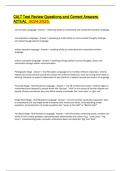CALT Test Review Questions and Correct Answers
ACTUAL 2024-2025.
oral receptive language - Answer-> (listening) ability to understand and comprehend spoken language
oral expressive language - Answer-> (speaking) a child's ability to communicate thoughts, feelings,
and ideas through spoken language
written receptive language - Answer-> (reading) ability to understand and comprehend written
language
written expressive language - Answer-> (spelling/writing) ability to convey thoughts, ideas, and
information through written communication
Prelinguistic Stage - Answer-> Oral Receptive Language (0-12 months) reflexive responses - infants
respond to environmental sounds and voices with reflexive behaviors, such as turning their heads or
blinking. Attention to speech: babies start to pay attention to speech sounds and rhythm of language
Preverbal Stage - Oral Receptive Language - Answer-> (12-18 months) first words - children begin to
comprehend and respond to simple words like "bye-bye", "milk" or the names of familiar objects and
people. Simple commands: they may follow simple commands like "come here" or "give me"
Single Word Stage - Oral Receptive Language - Answer-> (12-24 months) vocabulary expansion: start
to understand and use single words to express their needs and wants. Understanding simple
questions: comprehension of simple questions like "where is the ball?" or "What's that?"
Two-Word Stage - Oral Receptive Language - Answer-> (18-24 months) combining words: combine two
words to form simple phrases, expressing basic relationships and actions (e.g., "more juice", "big
truck"). Understanding basic concepts: understand basic concepts like "big" and "little".
,Early Multiword Stage - Oral Receptive Language - Answer-> (30+ months) complex sentences:
understand and respond to more complex sentences and questions. Grammar refinement & Story
comprehension
Mature Language Comprehension - Oral Receptive Language - Answer-> (3-5 years and beyond)
complex language skills: understand and use more sophisticated language structures. Abstract
thinking & Narrative skills.
Prelingustic Stage - Oral Expressive Language - Answer-> (0-12 months) cooing and babbling,
gestures (non-verbal, facial expressions, and body movements)
Holophrastic or Single Word Stage - Oral Receptive Language - Answer-> (12-18 months) first words,
limited vocabulary
Early Multiword Stage - Oral Receptive Language - Answer-> (24-30 months) sentence expansion,
vocabulary growth
Later Multiword Stage - Oral Receptive Language - Answer-> (30+ months) grammar development,
conversational skills
Complex Sentence Stage - Oral Receptive Language - Answer-> (3-4 years) use of complex sentences,
narrative skills
Mature Language Development - Oral Receptive Language - Answer-> (5 years and beyond) advanced
vocabulary, abstract thinking, social language skills
Jean Chall's Stages of Reading Development, 1983
Stage 0 - Answer-> Written Receptive Language
Stage 0 - Prereading (6 months to 6 years): pretends to read, retells the story when looking at pages
of a book. Names letters of the alphabet, recognizes some signs, prints own name, plays with books,
pencils, and paper
,Jean Chall's Stages of Reading Development, 1983
Stage 1 - Answer-> Stage 1 - Initial Reading and Decoding (grades 1-2.5): relation between letters
and sounds and between printed and spoken words, child is able to read simple text containing high
frequency words and phonically regular words; uses skills and insight to sound out new on syllable
words
Jean Chall's Stages of Reading Development, 1983
Stage 2 - Answer-> Stage 2 - confirmation and fluency (grades 2.5-3): reads simple, familiar stories
and selections with increasing fluency. Done by consolidating the basic deciding elements, sight
vocabulary, and meaning context in the reading of familiar stories and selections
Jean Chall's Stages of Reading Development, 1983
Stage 3 - Answer-> Stages 3 - reading from multiple viewpoints (grades 4-8) reading is a tool for
acquiring new knowledge
Jean Chall's Stages of Reading Development, 1983
Stage 4 - Answer-> Stage 4 - reading from multiple viewpoints (high school) reading critically from a
broad range of complex materials
Jean Chall's Stages of Reading Development, 1983
Stage 5 - Answer-> Stage 5 - construction and reconstruction (college and beyond) reading is used for
one's own needs and purposes. Reading serves to integrate one's knowledge with that or others, to
synthesize it and to create new knowledge. It is rapid and efficient.
Stages of Spelling Development (Multisensory Teacher of Basic Language Skills, Chapter "Teaching
Spelling" by Susanne Carreker) - Answer-> Prephonetic Stage, Semiphonetic Stage, and Phonetic
Stage
, Prephonetic Stage - Answer-> stage in spelling development in which not all of the sounds of the word
are represented by letters (e.g., js for dress)
Semiphonetic Stage - Answer-> stage in spelling development in which a child usually strings
consonants together to represent speech sounds in words and syllables (e.g. ntr for enter)
Phonetic Stage - Answer-> stage in spelling development in which every sound is represented, but the
complete knowledge of conventional orthography is not (e.g., sede for seed)
Stages of Writing (Phrases of Writing) Dr. Mel Levine
Stage One - Answer-> Stage One - Limitation (preschool to 1st grade) student pretends to write,
become aware that letters can be arranged into words, begin to organize letters and shapes in a
line, begin to print letters and numbers, have crude motor skills.
Stages of Writing (Phrases of Writing) Dr. Mel Levine
Stage Two - Answer-> Stage Two - Graphic Presentation (1st and 2nd grade) students are adept at
printing letters, preoccupied with appearance of letters, self conscious of classmate's ability, likely to
make more letter reversals during the early part of this stage, better at sequential ordering of letters
and numbers, become invented spellers.
Stages of Writing (Phrases of Writing) Dr. Mel Levine
Stage Three - Answer-> Stage Three - Progressive Incorporation (late 2nd to 4th grade) students
gradually incorporate standards of capitalization, punctuation, syntax, and grammar, stage includes
life if any advanced planning of content, conversational speech is more sophisticated and syntactically
complex that writing, writing is more often used to state the obvious or relate an experience rather
than solve problems or develop ideas, revisions and corrections are introduced, rewriting makes its
"educational debut", students bein to assess their own work.
Stages of Writing (Phrases of Writing) Dr. Mel Levine





